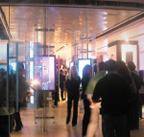 Home
Home 


WAM works with corporations to assess, develop and leverage sponsorship marketing programs in order to meet strategic business objectives.
WAM works with organizations seeking corporate sponsors (referred to as ‘Properties’) to maximize their revenue potential through effective marketing alliances.
At Rio 2016, the flow of wealth and struggles of poverty exist side by side
Vancouver 2010 had the mountains as a backdrop. China 2008 had the Great Wall. For Rio 2016, there are beautiful seaside landscapes but also the displacement of thousands of Brasilians pushed aside for the sake of the sixteen-day international competition. According to the Washington Post, an estimated 60,000 people have lost their homes as a direct result of the Olympic Games. Let that sink in for a moment. That is almost 9 times the population of Victoria County.
Hugh Wakeham is co-owner of the Two Buoys Café in Baddeck but also maintains a company that deals with sponsorship agreements for entertainment and educational productions. Last year, he was involved in the Toronto Pan Am Games in the area of international relations. The experience segued into a role as Manager of International Relations and Protocol for the Athlete’s Village at Rio 2016 where he is now. Hugh agreed to speak candidly with the Standard (via telephone from Brasil), about his experience at the Olympics and the stark class divide that exists in the city right now.
Wakeham’s role is to facilitate the visits of VIP officials – national political figures and corporate sponsors – to athletes in the village. Halfway through the international competition, Wakeham has already coordinated visits from the Secretary-General of the British Commonwealth, the King of Belgium, Prince Albert of Monaco, the Prince of Jordan, the President of Slovakia and numerous CEO’s and marketing VPs of sponsors like Panasonic, Samsung and Visa.
The Athlete’s Village itself is spectacular. Twenty condo towers surrounding an elaborate courtyard of facilities and services at the ready for every athlete. In addition to the Village, each nation has an off-campus house where athletes can convene and relax without the prying eyes and ears of the media. Wakeham describes these places as another scene of luxury.
“The British House took over a huge historic mansion in a jungle-like garden right in central Rio while the Canadians have taken over a private athletic facility. The German House is on the beach in the sand and they have a DJ playing hip-hop and the beer is flowing. Most of the houses are private for the athletes, but some like the Germans, have decided to make them public to celebrate their culture.”
Huge parties and celebrations appear to be the norm within the Village. But a much different experience exists outside the Olympic grounds.
“There is a strong feeling from those who live in Rio that all of this [Olympic facilities] is not for them because they can’t afford to attend the events. Many are without basic social necessities,” says Wakeham. “Education is very weak here. The healthcare system is underfunded – emergency rooms are being shut down for lack of funds. A lot of basic social needs are not being met.”
Beyond the recent expulsions, large populations remain in the favelas without running water, sewer or electricity. Some folks have been able to tap into the local electrical grid. Wakeham says locals in Rio are amused by how resourceful people in the favelas are. He believes there is hope that the favelas will become more integrated into the city, but at present, they are run primarily by gangs and drug warlords.
To his credit, Hugh has tried to do his part in becoming involved in a program called Fight for Peace.
“It’s a sponsored charity to engage children in the favelas to learn how to box,” explains Wakeham. “It’s a way to organize the kids, give them something constructive to do and get them off the streets away from the drugs and gun violence happening around them.
So between a land of luxury and a terrain of survival, how are athletes digesting this disparate reality? Does concentration on the game place blinders on those athletes visiting the city?
“You could exist in Rio and not know that the favelas are there. The way the athletes and dignitaries are being treated, there isn’t much, if any, contact with the favelas – visually or otherwise. I think athletes from other places are not even engaged in thinking about the issues that are going on there,” admits Wakeham.
However, he says the narrative is much different for Brasilian athletes.
“I know that a number of Brasilian athletes are from the favelas and they are dead serious about these games. They see this as the only hope that they have for a different life than the path that they’re on. So they are so competitive, serious and driven to succeed. They’re not partying in the streets. They are training, eating properly, getting coached, and getting ready for their games.”
For viewers back north, the daily struggles of thousands are but a footnote in an otherwise sunny broadcast. An opportunity for Peter Mansbridge to sound off before commercial, or a chance for a local newspaper reporter like myself to fill a page. Do not get me wrong. At the heart of the Olympics lies a spirit of international cooperation and competition that demonstrates our ability to excel and grow as a species. However, as an international body, the Olympic Committee must do better - much better – at addressing the social inequities that exist in the locations of the games. At the very least, there must be a concerted effort not to worsen the lives of those lived daily in game locations - the way the Rio Games have so poorly done this summer.
A local soccer team is set to go on a tour of England. The Strait Area Soccer Club’s U16 Boys team will be in London and Manchester from August 11 to 21.
The team has trained together for three years. Going to England will help them prepare for the rest of the season. While there, the team will participate in training sessions at the England National Training Centre. They will also play three games against local teams. The highlight of the trip will be the opportunity to watch two professional matches. They will visit many historical and cultural venues as well.
These young men are playing soccer with the Strait Area Soccer Club and hail from Inverness, Richmond, Victoria Counties and the Towns of Port Hawkesbury and Antigonish. Most of the team have provincial experience winning a bronze medal at the NS Provincial Championships in 2014. They have won the Cape Breton League in 2014 and 2015 as well as the CB Cup in each of those years. Most recently they won the gold medal over Sackville at the Connor Timmons Memorial Tournament in July.
This team has a coaching staff consisting of Alex Thomson, Drew MacQuarrie and Laurie Halfpenny MacQuarrie. The coaches, who have been with the Strait Area Soccer Club for many years, see trip as a valuable experience for these players as both athletes and young adults as they move on in life.
This is the third team from the Strait club to visit Europe in recent years. The Club has also sent teams to England and Spain in the past. Some of the members of the current team had siblings on those teams, which sparked the idea for this trip. The team will have a quick turn around when they get home. They are currently in first place in the Cape Breton Soccer League, and will be hosting the provincial championships on Labour Day Weekend.
The trip has been funded completely by team fundraising events and the players with to express their sincerest appreciation to everyone who has supported them, from individuals to generous local businesses and artisans.
